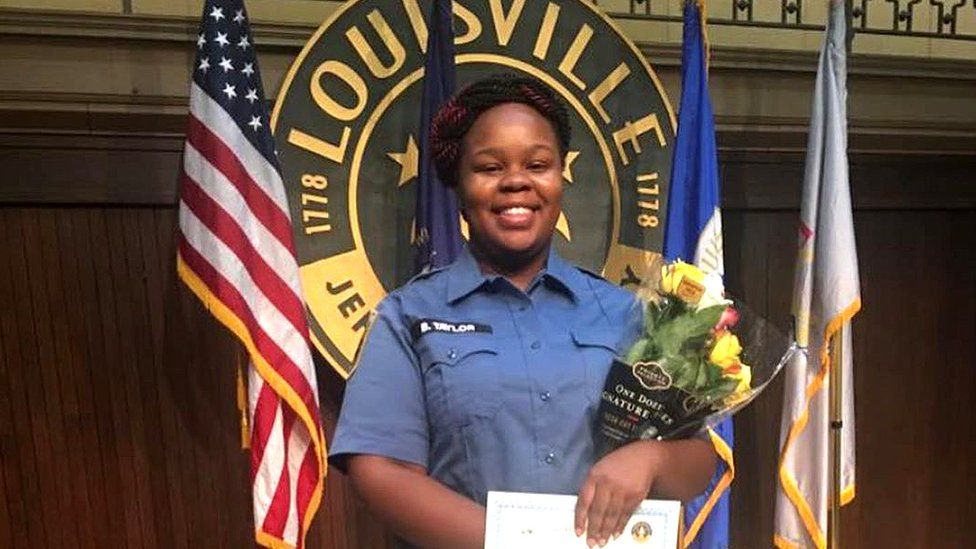Breonna Taylor: Grand jury 'not given chance to bring homicide charges'
- Published

A Kentucky grand juror has said the jury was not given the opportunity to consider homicide charges in the killing of Breonna Taylor by police.
Ms Taylor, a 26-year-old black hospital worker, was shot six times when police forced their way into her apartment in Louisville, Kentucky, on 13 March.
Last month the jury recommended no homicide charges against the officers.
The anonymous juror was permitted to release the statement by a judge who ruled it was in the public interest.
In the statement, they said the state's attorney general only presented to the grand jury - a panel drawn from members of the public to determine whether there is enough evidence to pursue a prosecution - wanton endangerment charges to be considered against one officer.
On 23 September, the jury charged one officer, Brett Hankison - not with Ms Taylor's death but with wanton endangerment for firing into a neighbour's apartment.
Two other officers who were involved have not been charged.
The ruling reignited Black Lives Matter protests in Louisville against police misconduct and racial inequality.
After the juror's statement was released, Kentucky Attorney General Daniel Cameron tweeted that he stood by his department's work, and would not be appealing against the judge's ruling.
"Indictments obtained in the absence of sufficient proof under the law do not stand up and are not fundamentally fair to anyone," he said.
In response Ben Crump, the lawyer representing Ms Taylor's family, accused Mr Cameron of misrepresenting facts to the jury.
He called for an independent prosecutor to hold new hearings, and to "do the work AG Cameron failed to do and seek justice for Breonna Taylor".
Ms Taylor's family sued the Kentucky city for the death in May and reached a $12m (£9.4m) settlement.
The killing of Ms Taylor has resonated around the world this year, with protesters calling on the public to "say her name".
What happened to Breonna Taylor?
Plainclothes police officers Hankison, Jonathan Mattingly and Myles Cosgrove stormed Ms Taylor's Louisville home shortly after midnight on 13 March.
Ms Taylor was in bed with her boyfriend, Kenneth Walker, at the time.
The officers were executing a search warrant as part of a drugs investigation.
Mr Walker fired a shot from his licensed gun, later telling police he thought that Ms Taylor's ex-boyfriend, Jamarcus Glover, had broken in, according to the New York Times.
Breonna Taylor’s boyfriend Kenneth Walker describes the night she was killed by police
Officials say Mr Walker's bullet struck Mr Mattingly in the leg. The three officers returned fire, discharging 32 rounds, according to a ballistics report from the FBI.
Ms Taylor was shot amid the commotion and died on the hallway floor.
A subsequent police report contained errors, including listing Ms Taylor's injuries as "none" and saying no force was used to enter, when a battering ram had been used.
Mr Hankison was fired from the police after investigators found he had "wantonly and blindly fired 10 rounds" during the raid, according to his termination letter.
Mr Mattingly and Mr Cosgrove were reassigned to administrative duties.
Why did officers storm her home?
The search warrant obtained by police included Ms Taylor's name and address. Authorities believed Mr Glover was involved in a drug ring and had used her apartment to hide narcotics.
No drugs were found at the property, though Jefferson County Prosecutor Thomas Wine said the search was cancelled after the shooting.
Mr Glover was arrested for drug possession on the night of Breonna Taylor's death. He has said that prosecutors pressed him to name Ms Taylor as a "co-defendant" in the case against him.
In May, Louisville postal inspector Tony Gooden said that another government agency had been asked in January to investigate whether Ms Taylor's home had been receiving suspicious mail. Mr Gooden did not name the agency but said it had found no evidence of wrongdoing.
Mr Glover also told the Courier Journal that he had sent packages of clothes and shoes to Ms Taylor's apartment because he feared they would be stolen from his own home.
- Published21 October 2020
- Published8 October 2020
- Published14 October 2020
- Published31 March 2023